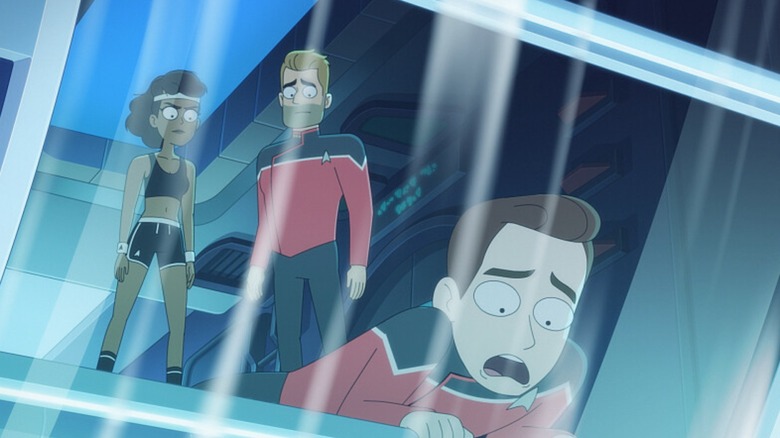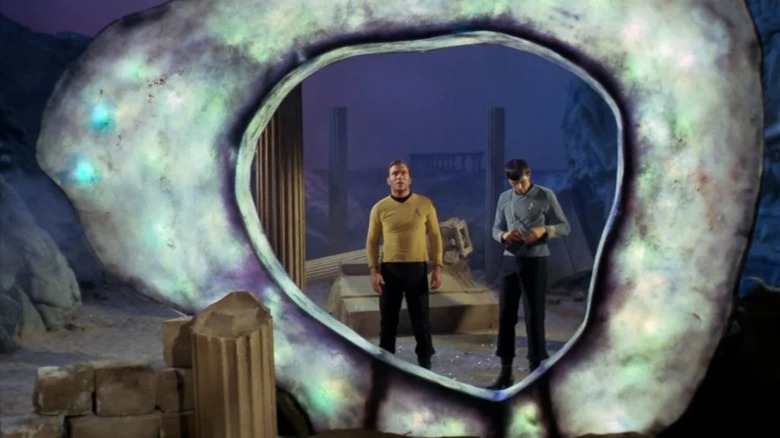Star Trek: Lower Decks Season 4's Weirdest Episode Title Is A Reference To A Legendary Sci-Fi Writer
This post contains spoilers for "Star Trek: Lower Decks" season 4.
"Star Trek" has always taken inspiration from titans of the science fiction genre. Whether it's "Strange New Worlds" delivering a heartbreaking riff on an Ursula Le Guin short story or "The Next Generation" scientists building on the concepts of Isaac Asimov, "Star Trek" has always worn its love of geeky sci-fi on its sleeve. It's only fitting, then, that the long-running franchise's most entertainingly chaotic entry, "Star Trek: Lower Decks," references one of 20th-century sci-fi's wildest figures: Harlan Ellison.
The nod to one of Ellison's works comes via the title of season 4, episode 2, "I Have No Bones Yet I Must Flee." In the context of the episode, this phrase is hilarious, as it references the inexplicable, bone-drinking capabilities of a cute creature called Moopsy that the "Lower Decks" crew discovers in a space menagerie (aka alien zoo). Moopsy looks like an adorable white blob and speaks (only its name, like a Pokemon) in a sweet tone of voice, but it's also capable of turning even the freakiest creatures in the menagerie into shapeless bags of skin and blood. It's messed up in a darkly funny way, so it's only fitting that the episode's title references an equally messed-up story.
'I am a great soft jelly thing...'
"I Have No Bones Yet I Must Flee" is a nod to "I Have No Mouth, and I Must Scream," a pitch-black dystopian story Ellison published in 1967. The story, which has been adapted into a computer game and radio play, imagines a future in which a sentient supercomputer called AM (Allied Mastercomputer) takes over the world and wipes out almost all of humanity, keeping just five humans alive in order to torture them. This might sound like your typical "computers taking over the world" story, but it was likely the prototype for many of the most disturbing visions of a tech-overrun world. "I Have No Mouth, and I Must Scream" is almost sadistically dark from beginning to end — which makes it an appropriately ironic reference point for a comedy show that features a creature as deceptively dangerous as Moopsy.
Though the title is a reference to Ellison, it might not be appropriate to call it a straightforward homage. The author, who died in 2018, had so many feuds and controversies in his life that his Wikipedia table of contents reads like a short story in itself. The prolific author of sagas like "A Boy and His Dog" has been accused of misdeeds ranging from silly (allegedly getting into a food fight at a 1969 convention where he was the guest of honor, apparently punching someone out after the Nebula Awards) to serious (among other things, he voiced support for sci-fi editor Ed Kramer when he was arrested for child molestation in 2000). During his lifetime, he also had a fraught relationship with "Star Trek" itself, making a modern "Trek" show's reference to him more complicated than it might seem.
Ellison v. Roddenberry
Ellison's relationship with "Star Trek" goes all the way back to the original series. The author is credited as the writer of one of the best episodes of Gene Roddenberry's series, "The City on the Edge of Forever." The season 1 outing sees Kirk (William Shatner), Spock (Leonard Nimoy), and Bones (DeForest Kelley) transported to Depression-era New York, where Kirk falls in love with a woman whose death he learns is necessary to prevent the Nazis from gaining nuclear power. It's a powerful, bleak, heart-wrenching hour of TV — one that perfected the idea of emotionally grounded time travel paradoxes that still bears fruit today. Ellison also apparently loathed it.
The writer was so bothered by rewrites made to his original draft of the script that he copyrighted the earlier version himself and sold it as part of the collection "Six Science Fiction Plays," and later in the scathing 30th-anniversary book "Harlan Ellison's The City on the Edge of Forever." After working together on the episode, Ellison and Roddenberry became engaged in a public feud that would last the rest of the latter's life and beyond. Ellison called Roddenberry a "hack" (among other things) in the aforementioned anniversary text, noting in the acknowledgments that while he was writing the book, "Gene Roddenberry screwed me up yet one more time by dying."
Ellison also sued CBS and Paramount – along with the Writers' Guild of America — for royalties related to the episode. The parties eventually settled. You might be wondering what any of this has to do with the latest episode of "Star Trek: Lower Decks." Not much, particularly, but it does make the show's co-opting of an Ellison title all the funnier. Would the infamously cantankerous author have laughed about it? Maybe not, but we certainly did.


